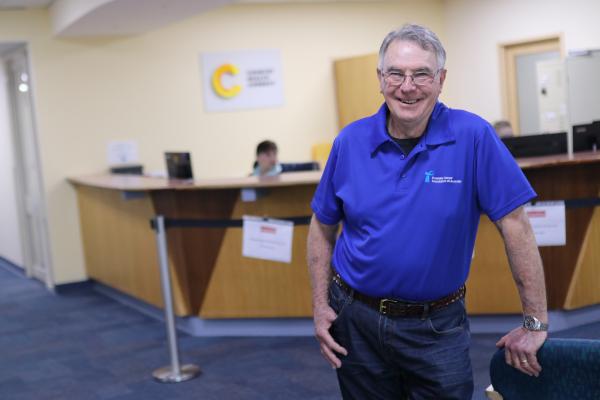
By Leon Georgiou
MOUNT Gambier man Richard Harry is a founding committee member of the Limestone Coast Prostate Cancer Support Group, a vital resource for people affected by prostate cancer and their families.
The group has built its reputation through fundraising and lobbying government for equipment and resources, aiming to help people who suffer from prostate cancer throughout the Limestone Coast.
Mr Harry’s contribution to that plight have been formally recognised with the prostate cancer survivor – along with two other recipients – awarded the Prostate Cancer Foundation of Australia’s Max Gardner Award for Distinguished Service.
Association chairman, associate professor Steve Callister said the recipients were truly remarkable figures in the Australian prostate cancer community, dedicating many hundreds of hours of service to other men and families impacted by the disease and raising awareness to help defeat it.
“I thank them for their voluntary service and contribution. Their tireless advocacy has changed many lives for the better,” Ass Prof Callister said.
Reflecting on the accolade with The Border Watch, Mr Harry played-down his significant community contributions.
“My name has been put on it [the award], but I really feel that it’s an award for our community,” he said.
“It’s not something that you go out there looking for or anything like that. I mean, it’s very humbling. It’s very humbling that your peers think that you should have this award.”
Mr Harry – who was diagnosed with prostate cancer about 10 years ago – explained that Murray Bridge was the closest support group available to him during his struggle with cancer.
The lack of a support group was a problem recognised by others within the Limestone Coast community which ultimately led to the creation of the LCPCSG.
“It was just after I’d had my surgery that there was a public meeting at Tenison. I think there were about 150 people who attended to see whether it was feasible to set up a support group down here,” Mr Harry said.
A few months later, the support group had been established and Mr Harry became its chair.
“I just felt that I didn’t want a lot of other guys to go through what I’ve gone through,” he said.
“And I thought, if we can get more information out there and get guys to get themselves tested… well it’s a good thing.”
The cancer support group has made some significant contributions during its existence.
In 2020/21, it helped raise $200,000 to purchase a transperineal biopsy machine for the Limestone Coast Local Health Network – increasing the ability of doctors to detect prostate cancer whilst simultaneously lessening the invasive nature of the procedure.
The group also lobbied the Federal Government for funding to employ a dedicated prostate cancer specialist nurse in Mount Gambier.
And whilst Mr Harry is proud of these achievements – which have brought about positive outcomes for people suffering with prostate cancer throughout the Limestone Coast – he is also proud of the emotional support offered by the group.
“As far as the [support] group is concerned, you’ve got a great bunch of people who look after one another, keep an eye out for one another… the group and the community have done a fantastic job,” he said.
And despite Mr Harry stepping back from the committee (as of the last AGM), he continues to try and raise awareness of the disease.
“I guess the thing that I promote more than anything is, if you’re fifty just go get yourself tested. If there’s a family history [of prostate cancer], get yourself tested from forty because that test could save your life,” he said.
And for those people who put off getting checked for prostate cancer thinking it involves an invasive examination of the prostate, Mr Harry explains that today, testing is simply a blood test.
“Any male from fifty onwards should speak to his GP about getting his PSA checked. I mean, all it is is a blood test. Very seldom now, does the doctor do a rectal examination,” he said.
“If that raises a red flag, then generally that person will be passed onto a urologist.”
People looking for more information can visit the support group meetings at 2pm every third Wednesday – in the Mount Gambier Community RSL meeting room.
While the group does not offer medical advice, it provides a confidential environment for people to discuss their own health, along with contact details for a range of experts where needed.
People who have had blood-test results that are giving them some early-warning concerns are also encouraged to join the group.
The next meeting is scheduled for July 21.







